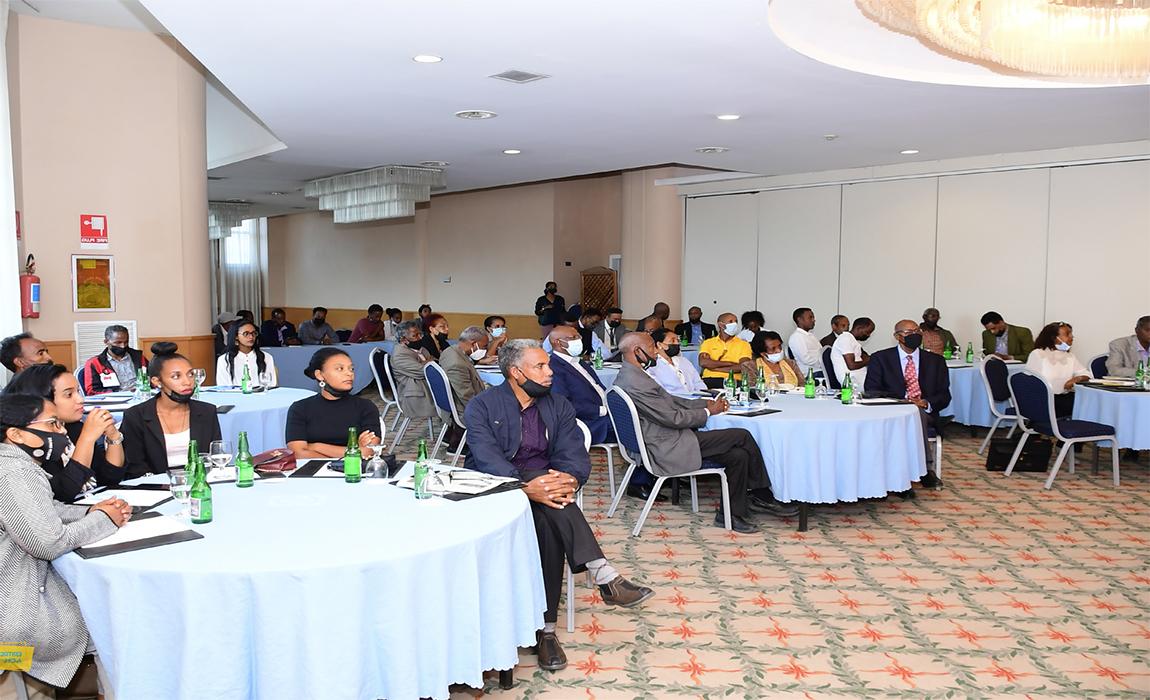Africa-Press – Eritrea. The Ministry of Agriculture (MoA), in collaboration with the Food and Agriculture Organization of the United Nations (FAO), implemented a Technical Cooperation Program, in a workshop held on June 16 2022, aimed at improving nutrition in Eritrea.
Earlier last year, a consultation workshop was held from 28 to 30 September 2021 at Asmara Palace Hotel to support the initiative and reinforce the outcome of the workshop and pave the way for plans for the development of nutrition through ‘Social Behavioral Change Communication’ (SBCC) Roadmap and Manual.
Both the consultation and validation workshops on the development of national nutrition manual aim at breaking the vicious cycle of malnutrition through effective nutrition plans.
In his opening speech at the workshop, Mr. Amanuel Negassi, advisor to the Minister of Agriculture, pointed out that the development of nutrition-sensitive agriculture has been a prominent component of the discussion. Awareness about nutrition is the biggest step toward achieving food and nutrition security and in preventing malnutrition related complications. Once a better production is achieved there will be better nutrition and better environment for a better lifestyle. Mr. Amanuel noted that the motto “No one left behind” should always be kept in mind for good development.
Dr. Eden Tarke, an Eritrean diaspora and nutritionist; an expert in biochemistry and nutrition toxicology, as well as a scientist and environmental chemist, said that 80% of a child’s development happens before the child is two years old, which means the mental and physical development of a child occurs during the first 1000 days, crucial period in the child’s growth and an opportunity to make a lifelong change.
The primary objective of the workshop was to change the behaviors that have been blocking efforts aimed at achieving nutrition security and ensure nutrition security at a national level by enhancing sensitization programs and developing a national strategic plan on nutrition.
Nutrition alone has the capacity to reduce incidents related to communicable and non-communicable diseases, that may occur due to poor dietary practice, by around 80%. Dr. Eden emphasized that a well-nourished child is more likely to escape poverty and to contribute to the development of a nation. And a well-functioning development program contributes to the nutrition of a child.
The participants of the workshop agreed that the public’s level of awareness about balanced diet is still limited even in households that can afford to have a variety of agricultural produce. After discussing the matter at length the participants concluded that by making minor changes in people’s awareness about balanced diet, it is possible to make big changes in nutrition.
Mr. Arefaine Berhe, Minister of Agriculture, said that the journey towards ensuring nutrition security is usually steady but not smooth. A preliminary assessment on nutrition was carried out in all regions of the country to identify rich local food recipes across the country and to create a viable venue for experience sharing among communities of the regions.
Underlining the impact sensitization materials will have in bringing about behavioral change in nutrition, Mr. Arefaine stressed that the MoA and the Ministry of Marine Resources, along with other partners, will exert concerted efforts to empower farmers and fishermen to ensure nutrition security. “I am certain we will make a difference through collective efforts,” the Minister added.
Household-based and community-based agriculture have been promoted by the MoA with a view to enabling households engage in poultry, dairy farm, beekeeping and horticulture at a household level in a bid to enable families have easy access to nutritious food. This way, every household will enjoy a balanced diet and no one would be left behind in having access to improved nutrition in the country.
Through the support of the MoA, a radical change in an agricultural package has had impact on communities’ nutritional habits. Communities in Habero, Geleb and Shebah, in Anseba region, and Gala- Nefhi, in Central region, have, for instance, benefitted from the Minimal Integrated Household Agricultural Project (MIHAP). Communities of Habero, who are traditionally agro-pastoralists, were able to grow surplus food and introduce new recipes to their dish as a result of MIHAP.
Market oriented production that tempts farmers to give utmost priority to the amount of harvest rather than the nutritional content of the food they grow has also been contributing to poor nutrition. Instead of applying diversified crop production system farmers have also been confined mostly to growing cereals such as sorghum, wheat and millet. Another factor contributing to challenges of food security is the low capacity in the utilization of marine resources and lack of the practice of supplying value added agricultural produce.
Issues that prompted in-depth discussion at the workshop include: the need for the reinforcement of sensitization campaigns on nutrition at community level, empowering farmers to cultivate nutrition sensitive agricultural produce as an effective means towards ensuring nutrition security, developing a national integrated strategic plan on behavioral communication as well as strengthening the role of cooperatives in nutrition security.
The participants suggested that an integrated approach to nutrition security should include ensuring optimal health of a society. Indicating that nutrition is not only about putting food on the table but safety, Dr. Eden stressed the importance of identifying food items that can boost health and variety of wild fruits and vegetables that could be added to the list of food items as part of the efforts to improve nutrition.
To ensure nutrition security in Eritrea in a short period of time, a multi-stakeholders integration is required. For this reason, the workshop brought together representatives from the ministries of Agriculture, Health, Marine Resources, Trade and Industry, Education, Human Welfare and Social Security, Information, Eritrean Standards Institution, National Union of Eritrean Women, FAO and other UN Agencies.
The ministries of Land, Water and Environment as well as Local Government will play a big role towards achieving the envisaged goal, and the participants called for an inclusive approach of all stakeholders in ensuring nutrition security.
The validation workshop was concluded with the presentation of comments and suggestions from group discussions as a way forward in the development and implementation of national nutrition strategy.
For More News And Analysis About Eritrea Follow Africa-Press







